27 july 2019

Hezbollah secretary-general Hasan Nasrallah has called for necessarily dealing with the issue of the Palestinian refugees working in Lebanon from a moral and humanitarian perspectives and quietly.
In televised remarks on Friday, Nasrallah said that some people in Lebanon incite against Hezbollah and Hamas and accuse them of being behind Palestinian protests against recent work measures, describing such accusation as “shameful, immoral and an attempt to twist facts.”
“In our opinion, there is a difference between Palestinian workers and other foreigners because the country of the former is under occupation and they cannot return to it,” the Hezbollah leader stated.
“The Palestinian is a refugee and associated with a national cause backed unanimously by Lebanon and the Arab region,” he said.
He also underlined that there is no connection between the work of the Palestinians in Lebanon and resettlement, adding that he supports the launch of a Lebanese-Palestinian dialog, but he called for dealing with this file wisely.
In televised remarks on Friday, Nasrallah said that some people in Lebanon incite against Hezbollah and Hamas and accuse them of being behind Palestinian protests against recent work measures, describing such accusation as “shameful, immoral and an attempt to twist facts.”
“In our opinion, there is a difference between Palestinian workers and other foreigners because the country of the former is under occupation and they cannot return to it,” the Hezbollah leader stated.
“The Palestinian is a refugee and associated with a national cause backed unanimously by Lebanon and the Arab region,” he said.
He also underlined that there is no connection between the work of the Palestinians in Lebanon and resettlement, adding that he supports the launch of a Lebanese-Palestinian dialog, but he called for dealing with this file wisely.
20 july 2019
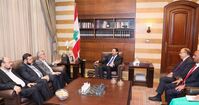
The Hamas Movement has affirmed that the Palestinian refugees in Lebanon have political status and that they are not expatriates or foreign workers.
This came during a meeting in Beirut on Friday between a delegation from Hamas led its political bureau member Ezzat al-Resheq and Lebanese premier Saad al-Hariri.
The Hamas delegation discussed the recent work measures taken by the Lebanese minister of labor against Palestinian workers and institutions.
According to Resheq, the delegation also discussed with Hariri the bilateral relations and the latest developments concerning the Palestinian situation in the refugee camps in Lebanon.
Resheq reiterated his Movement’s rejection of any plan to resettle the Palestinian refugees in Lebanon and its keenness on the country’s stability and security.
The Hamas official said that Hariri expressed his understanding of the delegation’s demands and asserted that his government would address the issue regarding the work measures that affected the Palestinian refugees.
This came during a meeting in Beirut on Friday between a delegation from Hamas led its political bureau member Ezzat al-Resheq and Lebanese premier Saad al-Hariri.
The Hamas delegation discussed the recent work measures taken by the Lebanese minister of labor against Palestinian workers and institutions.
According to Resheq, the delegation also discussed with Hariri the bilateral relations and the latest developments concerning the Palestinian situation in the refugee camps in Lebanon.
Resheq reiterated his Movement’s rejection of any plan to resettle the Palestinian refugees in Lebanon and its keenness on the country’s stability and security.
The Hamas official said that Hariri expressed his understanding of the delegation’s demands and asserted that his government would address the issue regarding the work measures that affected the Palestinian refugees.
18 july 2019

A man chants slogans while lifted on the shoulders of another wearing a Palestinian flag as a bandanna, as protesters block the main road outside the Palestinian refugee camp of Burj al-Barajneh, south of the Lebanese capital Beirut, on July 16, 2019
Lebanese Parliament Speaker Nabih Berri says the Arab country will reverse recent measures against businesses hiring foreign workers without permits.
Speaking at a parliamentary session in Beirut on Thursday, Berri said Palestinian laborers will return to the situation before the crackdown, urging Labor Minister Camille Abousleiman to convene a press conference and officially announce the latest decision, Lebanon-based Arabic-language al-Mayadeen television news network reported.
“No one has stood up to address Palestinians’ protests in refugee camps. The situation is nearing explosion and must be rectified. Otherwise, the situation will spiral out of control,” lawmaker Ammar al-Kalam said during the session.
“We want to treat Palestinians just like the Lebanese, and apply the law to them. We are in constant dialogue with the Palestinian ambassador (to Lebanon Ashraf Dabbour) and Palestinian authorities,” Abousleiman earlier told reporters outside parliament.
He added, “The Lebanese-Palestinian Dialogue Committee (LPDC) is the body that requested in 2017 to give Palestinians work permits. We have to stop the road riots because they make no sense, especially as these measures help workers. Once they are registered, the labor law provides them with guarantees against arbitrary dismissal and minimum wage.”
Last month, the Lebanese Labor Ministry announced a one-month deadline for companies to acquire work permits for their foreign workers. The ministry began to close businesses that did not comply after the deadline expired last week.
Over the past few days, hundreds of Palestinian refugees in Lebanon have staged protests in the capital Beirut and around their refugee camps.
Palestinian refugees expressed their anger on Tuesday at the decision, carrying out a general strike and protests across 12 camps.
The protests, under the slogan “Day of Anger,” paralyzed movement in the camps.
Protesters closed the entrances with burning tires. All Palestinian political forces and popular committees took part in the protests.
Palestinian refugees are not entitled to work in 72 professions in Lebanon, and are not permitted access to social security. One of the contradictions of the law is that Palestinians have the right to purchase a taxi, but are forbidden to work in it.
The Palestinian labor force is present in fragile sectors such as construction and small crafts.
Problems arise among Palestinians who graduate from Lebanese universities and cannot work in their specialties because of trade union limitations.
According to a study by the LPDC, there are 174,422 registered Palestinians in Lebanon.
Lebanese Parliament Speaker Nabih Berri says the Arab country will reverse recent measures against businesses hiring foreign workers without permits.
Speaking at a parliamentary session in Beirut on Thursday, Berri said Palestinian laborers will return to the situation before the crackdown, urging Labor Minister Camille Abousleiman to convene a press conference and officially announce the latest decision, Lebanon-based Arabic-language al-Mayadeen television news network reported.
“No one has stood up to address Palestinians’ protests in refugee camps. The situation is nearing explosion and must be rectified. Otherwise, the situation will spiral out of control,” lawmaker Ammar al-Kalam said during the session.
“We want to treat Palestinians just like the Lebanese, and apply the law to them. We are in constant dialogue with the Palestinian ambassador (to Lebanon Ashraf Dabbour) and Palestinian authorities,” Abousleiman earlier told reporters outside parliament.
He added, “The Lebanese-Palestinian Dialogue Committee (LPDC) is the body that requested in 2017 to give Palestinians work permits. We have to stop the road riots because they make no sense, especially as these measures help workers. Once they are registered, the labor law provides them with guarantees against arbitrary dismissal and minimum wage.”
Last month, the Lebanese Labor Ministry announced a one-month deadline for companies to acquire work permits for their foreign workers. The ministry began to close businesses that did not comply after the deadline expired last week.
Over the past few days, hundreds of Palestinian refugees in Lebanon have staged protests in the capital Beirut and around their refugee camps.
Palestinian refugees expressed their anger on Tuesday at the decision, carrying out a general strike and protests across 12 camps.
The protests, under the slogan “Day of Anger,” paralyzed movement in the camps.
Protesters closed the entrances with burning tires. All Palestinian political forces and popular committees took part in the protests.
Palestinian refugees are not entitled to work in 72 professions in Lebanon, and are not permitted access to social security. One of the contradictions of the law is that Palestinians have the right to purchase a taxi, but are forbidden to work in it.
The Palestinian labor force is present in fragile sectors such as construction and small crafts.
Problems arise among Palestinians who graduate from Lebanese universities and cannot work in their specialties because of trade union limitations.
According to a study by the LPDC, there are 174,422 registered Palestinians in Lebanon.
17 july 2019
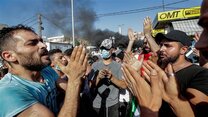
Palestinian refugees chant slogans as they block the main road outside the Palestinian refugee camp of Burj al-Barajneh, south of the Lebanese capital Beirut, on July 16, 2019, during a protest against a decision by the Lebanese government to impose restrictions on the Palestinians' work opportunities.
A top leader of the Palestinian Hamas resistance movement has condemned the Lebanese government's recent crackdown on businesses hiring foreign workers without permits, calling for the revocation of the measures in the Arab country.
Ismail Haniyeh, the head of the Hamas political bureau, in letters sent to Lebanese President Michel Aoun, Prime Minister Saad al-Hariri as well as Parliament Speaker Nabih Berri, demanded the Lebanese Ministry of Labor overturn a rule that requires Palestinian workers to obtain a work permit in order to gain employment.
Haniyeh expressed hope that Lebanese officials would rescind the legal and financial measures taken against Palestinian expatriates living in the country.
“We, in Hamas, see such measures as inconsistent with Lebanon’s official, historic and principled position in support of the Palestinian people’s rights,” he said.
He stressed that such measures would not serve the fraternal relations between the Lebanese and Palestinian nations, and would only further complicate the lives of Palestinian refugees.
Haniyeh finally described Palestinian refugees in Lebanon as “guests adherent to their identity and the right to return,” hoping for quick actions aimed at cessation of restrictive measures against the Palestinians and enabling them to live with dignity.
Last month, the Lebanese Labor Ministry announced a one-month deadline for companies to acquire work permits for their foreign workers. The ministry began to close businesses that did not comply after the deadline expired last week.
Over the past few days, hundreds of Palestinian refugees in Lebanon have staged protests in the capital Beirut and around their refugee camps.
Palestinian refugees expressed their anger on Tuesday at the decision, carrying out a general strike and protests across 12 camps.
The protests, under the slogan “Day of Anger,” paralyzed movement in the camps.
Protesters closed the entrances with burning tires. All Palestinian political forces and popular committees took part in the protests.
Palestinian refugees are not entitled to work in 72 professions in Lebanon, and are not permitted access to social security. One of the contradictions of the law is that Palestinians have the right to purchase a taxi, but are forbidden to work in it.
The Palestinian labor force is present in fragile sectors such as construction and small crafts.
Problems arise among Palestinians, who graduate from Lebanese universities and cannot work in their specialties because of trade union limitations.
A top leader of the Palestinian Hamas resistance movement has condemned the Lebanese government's recent crackdown on businesses hiring foreign workers without permits, calling for the revocation of the measures in the Arab country.
Ismail Haniyeh, the head of the Hamas political bureau, in letters sent to Lebanese President Michel Aoun, Prime Minister Saad al-Hariri as well as Parliament Speaker Nabih Berri, demanded the Lebanese Ministry of Labor overturn a rule that requires Palestinian workers to obtain a work permit in order to gain employment.
Haniyeh expressed hope that Lebanese officials would rescind the legal and financial measures taken against Palestinian expatriates living in the country.
“We, in Hamas, see such measures as inconsistent with Lebanon’s official, historic and principled position in support of the Palestinian people’s rights,” he said.
He stressed that such measures would not serve the fraternal relations between the Lebanese and Palestinian nations, and would only further complicate the lives of Palestinian refugees.
Haniyeh finally described Palestinian refugees in Lebanon as “guests adherent to their identity and the right to return,” hoping for quick actions aimed at cessation of restrictive measures against the Palestinians and enabling them to live with dignity.
Last month, the Lebanese Labor Ministry announced a one-month deadline for companies to acquire work permits for their foreign workers. The ministry began to close businesses that did not comply after the deadline expired last week.
Over the past few days, hundreds of Palestinian refugees in Lebanon have staged protests in the capital Beirut and around their refugee camps.
Palestinian refugees expressed their anger on Tuesday at the decision, carrying out a general strike and protests across 12 camps.
The protests, under the slogan “Day of Anger,” paralyzed movement in the camps.
Protesters closed the entrances with burning tires. All Palestinian political forces and popular committees took part in the protests.
Palestinian refugees are not entitled to work in 72 professions in Lebanon, and are not permitted access to social security. One of the contradictions of the law is that Palestinians have the right to purchase a taxi, but are forbidden to work in it.
The Palestinian labor force is present in fragile sectors such as construction and small crafts.
Problems arise among Palestinians, who graduate from Lebanese universities and cannot work in their specialties because of trade union limitations.
24 june 2019
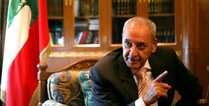
Lebanon will not be lured by a US plan to invest billions in the country, in return for settling Palestinian refugees, Lebanese parliament speaker, Nabih Berri said on Sunday (Jun 23).
“Those who think that waving billions of dollars can lure Lebanon, which is under the weight of a suffocating economic crisis, into succumbing or bartering over its principles are mistaken,” Berri said in a statement from his office.
“The rejection of settling Palestinian refugees who must have the right of return stands at the forefront of these principles,” he said, adding that “any investment at the expense of the Palestinian cause will not find fertile ground in Lebanon.”
US President Donald Trump’s “deal,” regarding the Israeli-Palestinian issue, is set to be presented by his son-in-law, Jared Kushner, at a conference in Bahrain, on Jun 25 to 26, envisions a US$50 billion investment plan to lift the Palestinian and neighboring Arab state economies.
But, it has met broad rejection in the Arab world, even as some in the Gulf called for giving it a chance.
The US plan envisions spending more than half of the US$50 billion in the Palestinian territories over 10 years while the rest would be split between Egypt, Lebanon and Jordan.
“Those who think that waving billions of dollars can lure Lebanon, which is under the weight of a suffocating economic crisis, into succumbing or bartering over its principles are mistaken,” Berri said in a statement from his office.
“The rejection of settling Palestinian refugees who must have the right of return stands at the forefront of these principles,” he said, adding that “any investment at the expense of the Palestinian cause will not find fertile ground in Lebanon.”
US President Donald Trump’s “deal,” regarding the Israeli-Palestinian issue, is set to be presented by his son-in-law, Jared Kushner, at a conference in Bahrain, on Jun 25 to 26, envisions a US$50 billion investment plan to lift the Palestinian and neighboring Arab state economies.
But, it has met broad rejection in the Arab world, even as some in the Gulf called for giving it a chance.
The US plan envisions spending more than half of the US$50 billion in the Palestinian territories over 10 years while the rest would be split between Egypt, Lebanon and Jordan.
23 june 2019
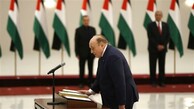
Palestinian Finance Minister Shukri Bishara
Palestinian Finance Minister Shukri Bishara has rejected the recently-released details about the economic section of a US-devised plan on the Israeli-Palestinian conflict as an “illusion” that will fail to bring about peace.
Addressing an Arab League meeting in the Egyptian capital city of Cairo on Sunday, Bishara slammed a June 25-26 meeting Bahrain, during which Washington is set to unveil the economic aspect of US President Donald Trump’s so-called “deal of the century.”
“We don’t need the Bahrain meeting to build our country, we need peace, and the sequence of (the plan) — economic revival followed by peace is unrealistic and an illusion,” he said.
The White House on Saturday unveiled the details of the economic portion of Trump’s deal, which would inject $50 billion into struggling economies in the Middle East over the next ten years.
Under the document, dubbed “Peace to Prosperity,” over half of the funds ($28 billion) would go toward the West Bank and the Gaza Strip and the remaining to Jordan, Lebanon and Egypt, which have absorbed Palestinian refugees.
'Lebanon won't exchange Palestinian cause with US money'
Separately on Sunday, Lebanon’s Parliament Speaker Nabih Berri emphasized that his country would not be lured by the American initiative to invest billions in the country in return for settling Palestinian refugees.
“Those who think that waving billions of dollars can lure Lebanon, which is under the weight of a suffocating economic crisis, into succumbing or bartering over its principles are mistaken,” he said in a statement.
At the forefront of Lebanon’s principles is the rejection of settling Palestinian refugees who must have the right of return to their homeland, he added.
Palestinian Finance Minister Shukri Bishara has rejected the recently-released details about the economic section of a US-devised plan on the Israeli-Palestinian conflict as an “illusion” that will fail to bring about peace.
Addressing an Arab League meeting in the Egyptian capital city of Cairo on Sunday, Bishara slammed a June 25-26 meeting Bahrain, during which Washington is set to unveil the economic aspect of US President Donald Trump’s so-called “deal of the century.”
“We don’t need the Bahrain meeting to build our country, we need peace, and the sequence of (the plan) — economic revival followed by peace is unrealistic and an illusion,” he said.
The White House on Saturday unveiled the details of the economic portion of Trump’s deal, which would inject $50 billion into struggling economies in the Middle East over the next ten years.
Under the document, dubbed “Peace to Prosperity,” over half of the funds ($28 billion) would go toward the West Bank and the Gaza Strip and the remaining to Jordan, Lebanon and Egypt, which have absorbed Palestinian refugees.
'Lebanon won't exchange Palestinian cause with US money'
Separately on Sunday, Lebanon’s Parliament Speaker Nabih Berri emphasized that his country would not be lured by the American initiative to invest billions in the country in return for settling Palestinian refugees.
“Those who think that waving billions of dollars can lure Lebanon, which is under the weight of a suffocating economic crisis, into succumbing or bartering over its principles are mistaken,” he said in a statement.
At the forefront of Lebanon’s principles is the rejection of settling Palestinian refugees who must have the right of return to their homeland, he added.
13 june 2019
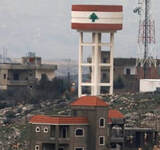
Israeli soldiers abducted, on Wednesday evening, two shepherds near Shebaa Lebanese town, and took them to the occupied Shebaa Farms, the Lebanese National News Agency has reported.
The agency said the one of the abducted shepherds is from Lebanon, while the second is Lebanese.
It added that the Lebanese Army contacted the United Nations Interim Force in Lebanon (UNIFIL) to coordinate their release and return to Lebanon.
The agency said the one of the abducted shepherds is from Lebanon, while the second is Lebanese.
It added that the Lebanese Army contacted the United Nations Interim Force in Lebanon (UNIFIL) to coordinate their release and return to Lebanon.
